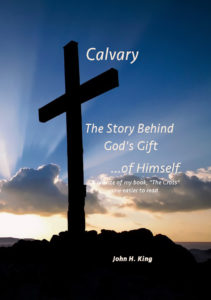[taken from my newest project: Calvary: The Story Behind God’s Gift of Himself]
It is not uncommon for God in the Bible to use examples from life to explain deeper truths. Hosea became such a lesson (Isaiah 20:3; Hosea 1:2; 3:1). The story behind Hosea’s marriage to his wife, Gomer, is actually God’s story with Israel. Gomer had been a prostitute, whom God asked Hosea to marry, knowing all along the similarities that would surface between their relationship and His with Israel.
[Keeping this in mind:]
Jesus’ death on Calvary for our sins in our place became a powerful proclamation of forgiveness—a message God wants every Christian everywhere to carry with them into their world. Forgiveness is not a word psychologists use or are comfortable with. The Church owns this idea. It is a Biblical concept. It is God’s creation even though it is basically a simple idea. When someone holds on to such negative feelings and thoughts as hate, grudges, revenge, and bitterness, they do themselves harm. To forgive means literally, in the language of Scripture, “ to let it go.” It completes a redemption because it supports the outward action with a corresponding inward one. When Hosea, who we spoke of already, bought back his wife to become her husband, he still needed to forgive her … and, no doubt, she, him.
 God paid a huge price in the death of His Son to free us from all the evil that was systemic in our nature and create in us a new heart, as another prophet, Ezekiel, explained it (Ezekiel 11:19). This is redemption (Ephesians 1:4) and forgiveness is a necessary part of it. Paul echoed the message. “The price of our freedom, our redemption,” Paul taught, “was Jesus’ shed blood which includes our forgiveness; these are two provisions of a multifaceted grace” (Ephesians 1:7).
God paid a huge price in the death of His Son to free us from all the evil that was systemic in our nature and create in us a new heart, as another prophet, Ezekiel, explained it (Ezekiel 11:19). This is redemption (Ephesians 1:4) and forgiveness is a necessary part of it. Paul echoed the message. “The price of our freedom, our redemption,” Paul taught, “was Jesus’ shed blood which includes our forgiveness; these are two provisions of a multifaceted grace” (Ephesians 1:7).
I have chosen in this work to use this upcoming chapter to talk about our forgiving others. Like Hosea’s experience, nothing exemplifies, nothing teaches the lesson of, divine forgiveness like God using us in our circumstances to demonstrate it. When we affirm Jesus’ death as an act of God forgiving us alone, we have found a dogma but not the inspiration of that dogma that brings it to life. Unforgiveness coming with lingering hurts robs us of a future. When we forgive those who are, otherwise, unforgivable for things we accuse them of having done to us—when we let it go, for real—we not only get our future back but we could not preach a louder more emphatic message of God’s love.


